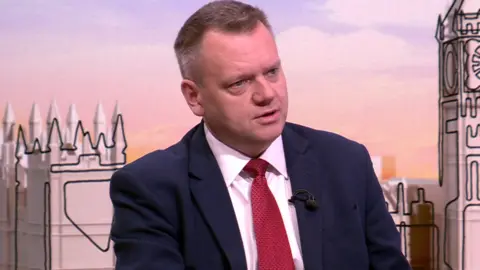Minister 'pushing' for deal over use of EU passport e-gates
 BBC
BBCThe government is pushing for a deal that would allow UK passport holders to use EU airport e-gates, a minister has confirmed.
Nick Thomas-Symonds, who said negotiations were in the "very final hours" ahead of a UK-EU summit in London, described stopping people being stuck in border queues as a "very sensible objective".
Asked whether the UK would have to follow more EU rules in some areas as part of any deals, the European relations minister told the BBC's Sunday with Laura Kuenssberg "it will mean taking a sovereign choice as to... the common standards we wish to align".
Conservative MP Alex Burghart claimed the government's proposed deal with the EU could mean the UK becoming a "rule taker".
The UK and EU will hold their first bilateral summit since Brexit on Monday, described by Prime Minister Sir Keir Starmer as a "really significant moment".
Sir Keir is expected to announce a deal when he meets European Commission President Ursula von der Leyen and European Council President Antonio Costa.
Announcements around trade and security have been expected to include British access to a 150 billion euro (£125 billion) EU defence fund, in what could be a boost for UK defence companies.
But reports suggest there could also be agreements on allowing British travellers to use e-gates at European airports, cutting red tape on food exports and imports, and setting up a youth mobility scheme with the EU.
Thomas-Symonds, who is leading the negotiations, said he was driven by "ruthless pragmatism" and focused on jobs, lower household bills and stronger borders.
The minister also said the government would assess whether to contribute money to EU projects on a case-by-case basis, saying it would "consider each one on its merits".
Asked whether he was confident British travellers would be able to use EU e-gates at European airports, Thomas-Symonds said: "I'm certainly pushing for people to be able to go through far more quickly.
"I think we can all agree that not being stuck in queues and having more time to spend, whether it's on holiday or work trips, having more time to do what you want ... would be a very sensible objective."
The minister said he was confident about a deal on food, but added "nothing is agreed until everything is agreed".
He added: "We know we've had lorries waiting for 16 hours, fresh food in the back not able to be exported because frankly it's just going off, red tape, all the certifications that are required, we absolutely want to reduce that."
Burghart told the programme his main concern was the government signing up to EU standards and becoming "a rule taker - one of the things we specifically left behind when we left the EU".
He said the government had not ruled out "dynamic alignment", which would see the UK and EU maintain equivalent regulatory standards on food and trade, despite the UK not being "in the room" when future decisions are taken.
He added: "As the government hasn't ruled that out we have to assume it's very firmly on the table and is about to happen.
"And if it is about to happen, then that is a surrender of some of Britain's sovereignty and we won't stand for it".
On a deal around whether young people from the EU can come to live and work in the UK and vice versa, Thomas-Symonds insisted he was negotiating around "a smart and controlled scheme", adding "nobody is remotely suggesting that's freedom of movement. That's a red line for us".
The minister did not respond directly to questioning on whether there would be a cap on numbers or time-limited visas, such as in existing schemes with Australia and Canada, but did stress "that control element is hugely important".
He also denied there were plans to exempt student numbers from overall migration figures and added "anything agreed - and I stress this is in sensitive final hours - will be consistent with reducing the level of net migration as we've promised".
Appearing on the same programme, Liberal Democrat MP Calum Miller said he was "troubled by the sense the government isn't seizing this moment, in the context of a changed environment, to really go further" on EU relations.
The party's spokesperson for foreign affairs said "setting ourselves on an ambitious path towards a customs union is the best way to give some certainty to British businesses".
Miller also claimed removing red tape between the UK and EU could be worth £25bn, and a customs union could increase the revenue further.
Reform UK leader Nigel Farage claimed an EU deal that included a youth mobility scheme and extending fishing rights for the EU in British waters would mean that "to a large extent, Starmer will be betraying Brexit" and he would "get rid of it" if he was prime minister.
Speaking to BBC Radio 4's Broadcasting House, Farage said a youth mobility scheme would be "free movement of people to the under 30s" and "we know that'll be a one-way street - way more people will come here than will go in the other direction".
Farage suggested a deal on defence would mean "we're going to see by the looks of it British soldiers under an EU flag" before adding "EU cooperation absolutely, under an EU flag, no".

Sign up for our Politics Essential newsletter to read top political analysis, gain insight from across the UK and stay up to speed with the big moments. It'll be delivered straight to your inbox every weekday.
